
As I listened to the priesthood session of the LDS 2017 semi-annual conference, I was reminded of how aspirational Mormonism is. I recalled how easy it was to be inspired in the comfort of a meeting house, how natural it is for young priesthood holders to think anything possible, what it is to want it to be true, no matter how fantastic it sounds, to look into the eyes of others for affirmation, knowing they look back seeking the same; restless, striving, I-can-do-this Mormonism.
Fawn Brodie, in her seminal work No Man Knows My History observed:
‘Joseph’s clergy was…entirely composed of laymen; moreover, of practically all the laymen in his church. The result was a pyramidal church structure resting on the broadest possible base and possessing astonishing strength. By giving each man a share in the priesthood Joseph quickened a sense of kinship and oneness in the church.
…What Joseph had created was essentially an evangelical socialism…Nearly every man had a New Testament title – deacon, teacher, priest, elder, “seventy”, or bishop. Each title carried a certain rank, progression from lower to higher being dependent upon a man’s faith, his zeal for the church, and the good will of his superiors in the hierarchy. Each convert had not only the dignity of a title but the duties attending it. He was expected to work strenuously for the church, and he did. His only recompense, and it was ample, was a conviction that he was furthering the work of the Lord in the last days.’ (pp.100-01.)
If we were to talk about the ‘Mormon Dream’ it would be the ‘American Dream’ writ large across eternity, the goal nothing less than executive priesthood power over your own creation, success defined as godhood. Despite recent and increasingly regular protests from some Mormon women, priesthood in the Mormon Church is confined to men, who are encouraged at every turn to press on to such heights, bringing their prospective goddess wives with them. Mormon women should, perhaps, remember they cannot be exalted without their husband and his priesthood:
‘No woman will get into the celestial kingdom, except her husband receives her, if she is worthy to have a husband; and if not, somebody will receive her as a servant’ (LDS Apostle Lorenzo Snow, (Journal of Discourses, vol. 5, p 291)
Mormon men were, in this session, reminded of this daunting weight of responsibility.
Elder Richard J Maynes of the Seventy, in a stirring talk, reminded the room, ‘…perhaps there is no greater compliment we could receive from the Lord than to know He trusts us to be worthy priesthood holders and great husbands and fathers.’
Integrity of heart his theme, he brought the sober reminder that, ‘…earning the Lord’s trust is a blessing that comes through great effort on our part. Trust is a blessing based on obedience to God’s laws. Earning the Lord’s trust comes as a result of being true to the covenants we have made in the waters of baptism and in the holy temple.’
Elder David F Evans of the Seventy insisted each of us, ‘has a personal responsibility to do what is necessary to obtain and keep a strong testimony…Patient covenant keeping,’ he continues later, ‘brings the blessings of heaven into our lives’
Dieter Uchtdorf, second counsellor in the first presidency, in what seemed at times a rambling presentation, spoke about being light-bearers:
‘Brethren, it is up to us to be in the right place to see the divine light and truth of the gospel of Jesus Christ. Even when night has fallen and the world seems dark, we can choose to walk in Christ’s light, keep His commandments, and courageously testify of His reality and His greatness. As a bearer of God’s priesthood and as a disciple of Jesus Christ, you are a bearer of light. Keep doing the things that will nurture His divine light.’
Henry B Eyring, first counsellor in the first presidency (You see now Fawn Brodie’s point about title, rank, and progression) reminded all that ‘The Lord Leads His Church,’ before going on to say, ‘The Lord’s leadership of His Church requires great and steady faith from all who serve Him on earth,’ insisting further, ‘For a leader to succeed in the Lord’s work, the people’s trust that he is called of God must override their view of his infirmities and mortal weaknesses.’
Dale G Renlund of the quorum of the twelve apostles reminded priesthood holders, ‘For Heavenly Father’s purposes to be accomplished, Christ’s atoning power needs to be made available to God’s children. The priesthood delivers these opportunities.’
Priesthood holders are to be worthy, earning God’s trust through great effort, strictly obedient to God’s laws, true to their covenants, taking personal responsibility to do what is necessary. It is up to the priesthood holder to choose to keep the commandments, to have great and steady faith, with a duty to deliver Christ’s atoning power to God’s children, and to keep doing…and doing, and doing.
A Mormon isn’t saved in any sense a Christian would understand. What Christians call resurrected, Mormons call ‘saved,’ what Christians call ‘saved,’ Mormons call ‘exalted,’ and it is this exaltation for which they daily strive, never knowing if they have done enough. This is not a saved people aspiring to fully come into the good of all Christ has won for them. This is an aspirational people striving to prove worthy of all God has for the strongest, fittest, most faithful and accomplished of his children.
What I Once Thought Gain…
I am reminded of Paul’s description of his former self in his letter to Philippi,
‘…circumcised on the eighth day, of the people of Israel, of the tribe of Benjamin, a Hebrew of Hebrews; in regard to the law, a Pharisee; as for zeal, persecuting the church; as for legalistic righteousness, faultless.’ (Philippians 3:5-6)
I imagine a Mormon striving to something similar, ‘baptised at eight, born in the covenant, a Mormon of Mormons; in regard to law, an elder; as for zeal, faithfully carrying out church callings; as for legalistic righteousness, worthy of God’s trust, striving, obedient, covenant-keeping, commandment-keeping, temple worthy, having steady faith, doing, doing, and doing.’
But I remember how Paul goes on to say of his zeal and self-righteousness, ‘But whatever was to my profit I now consider loss for the sake of Christ…I consider them rubbish (Gk. skoo’-bal-on, excrement), that I may gain Christ and be found in him, not having a righteousness of my own that comes from the law, but that which is through faith in Christ – the righteousness that comes from God and is by faith.’ (Philippians 3:7-9)
What did Paul see that Nicodemus did not? Remember how the faithful Pharisee Nicodemus, ‘came to Jesus at night…’ and recognised Jesus as having been sent by God. ‘In reply Jesus declared, “I tell you the truth, no-one can see the kingdom of God unless he is born again.”‘ Jesus unpacks this teaching but Nicodemus fails to understand, and Jesus’ response is an indictment, ‘You are Israel’s teacher and do you not understand these things?’
This is the passage where Jesus goes on to explain, ‘Just as Moses lifted up the snake in the desert (Num.21:8-9), so the Son of Man must be lifted up, that everyone who believes in him may have eternal life. For God so loved the world that he gave his one and only Son, so that whoever believes in him shall not perish but have eternal life. (Jn.3:1-16) This ‘eternal life’ is a quality of life, God’s quality of life, gifted to all who trust in Jesus. What the LDS priesthood-holder strives for, Christ has achieved for us, it is not earned, or merited.
Those Strange ‘Born-Agains’
There is this thing Evangelicals (born-agains) do. With Paul, they insist, ‘No-one will be declared righteous in his sight by observing the law…For we maintain that a man is justified by faith apart from observing the law.’ (Romans.3:20-28) They justify this in light of James’ insistence, ‘Whoever keeps the whole law and yet stumbles at just one point is guilty of breaking all of it.’ (James.2:1-13) James carefully explains that this is because if you sin you become a law breaker, and its what you have become that marks you unworthy, not how hard you have, or haven’t tried. Its a neat argument, and no getting away from it.
- No-one is capable of keeping the whole law and ‘your best’ doesn’t cut it.
- There must, therefore, be some other way of getting right with God.
Paul insists we are ‘justified by faith,’ and though he was a brilliant law-keeper, yet it was all worthless.
Jesus said people gain eternal life by believing in him.
Yet, anyone who pays attention will know the New Testament is full of imperatives to do good works. Peter urges good works, ‘that [men] may see your good deeds and glorify God…’ (1 Peter 2:1
Hebrews encourages,
‘Let us consider how to stir up one another to love and good works.’ (Heb.10:24)
Jesus taught,
‘Let your light shine before others, so that they may see your good works and give glory to your Father who is in heaven.’ (Mt.5:16)
Paul writes we should ‘do good, be rich in good works, be generous and ready to share…’ (1 Tim.6:18)
And, of course, James insists, ‘Faith without works is dead.’ (James 2:17)
Then we see those strange ‘saved-by-grace-not-works’ Christians faithfully gather for worship, giving sacrificially, going the extra mile, being good neighbours, loving their enemies, fasting and praying, striving to be salt and light in the world, and storing up treasure in heaven. What is going on, if they ‘don’t believe in works?’
Christians, it seems, believe in obedience, making and keeping covenants, growing in faith, taking responsibility, and sharing the good news of Jesus. They know James’ timely reminder, ‘Faith without works is dead.’ They grasp James’ challenge, ‘Show me your faith without works, and I will show you my faith by what I do.’ (Js.2:17-18) And that is what Christians do.

James makes it clear that living faith issues in action. That is his point; faith is the tree, fruit its product. If the tree is dead, James insists, the fruit will be absent. The fruit is evidence of a living tree. Where Mormons see good works as the emphasis of James’ teaching, the real emphasis is faith. An absence of good works is evidence of a dead faith, the presence of good works is evidence of living faith. It is that living faith that saves, and not the fruit it produces.
Paul writes, ‘It is by grace you have been saved (note the past tense) through faith – and this not from yourselves, it is the gift of God – not by works, so that no-one can boast.’ (Eph.2:8) There is no contradiction here. Clearly, Paul agrees with James, urging us to, ‘do good, to be rich in good works, to be generous and ready to share…’ (1 Tim.6:18) Yet he is clear in his teaching – works don’t save. Paul the evangelist is effectively explaining how we are put right with God, James the pastor how a saved people live.
Just as a tree is first planted, then produces fruit, so a Christian is first born-again, then produces the good works that are the natural product of an established and well-nurtured Christian life.
All Things New
When Jesus instituted what we call communion, what Mormons call ‘sacrament,’ he said, ‘This cup is the new covenant in my blood.’ (Lk.22:20) He is described as, ‘the mediator of a new covenant.’ (Heb.9:15) Church leaders are, ‘ministers of a new covenant, not of the letter but of the Spirit. For the letter kills, but the Spirit gives life.’ (2 Cor.3:6) Christians are to, ‘Walk in newness of life.’ (Ro.6:4) a new life that is described in some detail in the Sermon on the Mount. To an unregenerate person this can seem every bit as daunting as being told in a priesthood session to be worthy, be great, keep commandments and covenants, obey laws and keep doing, doing, and doing, because its up to us.
But Jesus told Nicodemus, ‘You must be born again.’ This means more than simply coming to a decision to follow him and putting our backs to the task. To be born again is to be a new creature. Paul writes, ‘If anyone is in Christ, he is a new creation, the old has passed away, behold, the new has come.’ Note again the tense (2 Cor.5:16-17 ESV) Warning believers in Galatia against trusting in law-keeping, Paul writes ‘Neither circumcision counts for anything, nor uncircumcision, but a new creation.’ (Gal.6:15)
He urges believers in Colossae, ‘Do not lie to one another, seeing that you have put off (tense again) the old self, with its practices and have put on the new self, which is being renewed in knowledge after the image of its creator.’ (Col.3:9-10) This renewing in knowledge is not simply learning and striving to keep to better ways. To saints in Ephesus Paul describes it as being renewed in the spirit, or attitude, of your minds, ‘and [putting] on the new self, created after the likeness of God in true righteousness.’ (Eph.4:23-24)
To be born again is all these and more. It is to be recreated, like the first creation a work of God, and it is this new creature that follows after God, confident in the promise of Jesus:
‘I tell you the truth, whoever hears my word and believes him who sent me has eternal life and will not be condemned; he has crossed over from death to life.’ (John 5:24)
This text is weighted with incredible promises. The present possession of eternal life, the confidence that we will not be condemned, and the knowledge that death no longer has dominion. All this because of the finished work of Christ on the cross, because of a risen Saviour, and an empty tomb, and the promise of Jesus that,
‘God so loved the world that he gave his one and only Son, that whoever believes in him shall not perish but have eternal life.’ (John 3:16)
One of those priesthood-holders may say, ‘I believe in Jesus, so all this must apply to me. I am saved!’ Two problems immediately present themselves. The first is that this teaching is alien to Mormonism. The Mormon Church simply doesn’t teach it though it is the theme running through the teaching of every New Testament writer. The second is that putting your faith in Jesus totally precludes putting your faith in anything or anyone else. It is Christ or works, not faith and works. The Mormon Church demands, however, that these priesthood holders earn these blessings by great efforts, taking personal responsibility to do what is necessary, to keep their temple covenants, to prove worthy, and gain celestial glory. These are the efforts, this the thinking of the old creature
Eternal life is for that new creature, who has put off the old self, and is being renewed after the image of his creator, created after the likeness of God in true righteousness, having been made alive in Christ, having received the promised Holy Spirit.
Having entered the new covenant mediated by Jesus, experienced the new birth (1 Pet.1:3), this new creation walks through this world in the full assurance of God’s promise that he is making all things new (Rev.21:5) and that, ‘we have the first fruits of the Spirit [and] groan inwardly as we wait eagerly for our adoption as sons, the redemption of our bodies. For in this hope we are saved.’ (Ro.8:23-24)
‘All this from God, who reconciled us to himself through Christ and gave us the ministry of reconciliation; that God was reconciling the world to himself in Christ, not counting men’s sins against them. And he has committed to us the message of reconciliation. We are therefore, Christ’s ambassadors, as though God were making his appeal through us. We implore you on Christ’s behalf: be reconciled to God.
God made him who had no sin to be sin for us, so that in him we might become the righteousness of God’ (2 Cor.5:17-21)
Michael Thomas is a former Mormon and is chairman of Reachout Trust

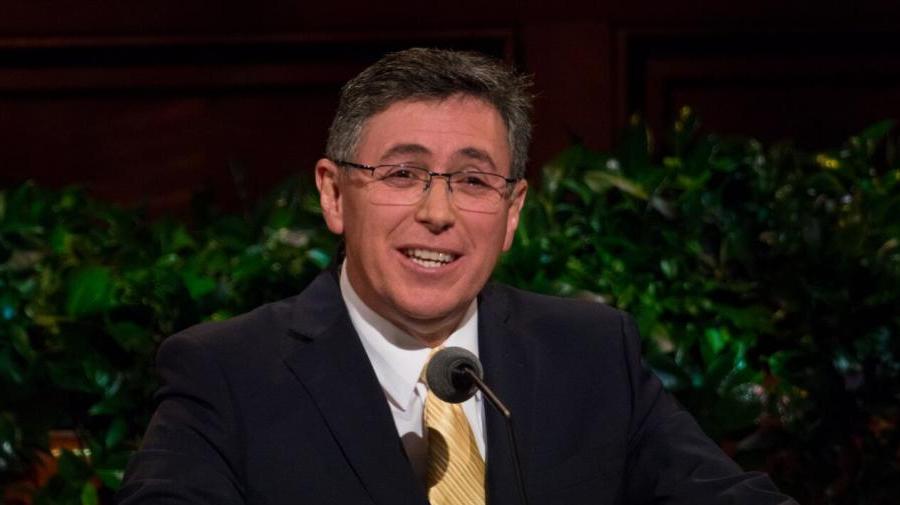
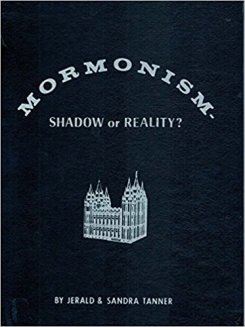
 Anyway finally on Sandra Tanner, she was interviewed in the last few years on the Mormon Stories podcast,
Anyway finally on Sandra Tanner, she was interviewed in the last few years on the Mormon Stories podcast, 


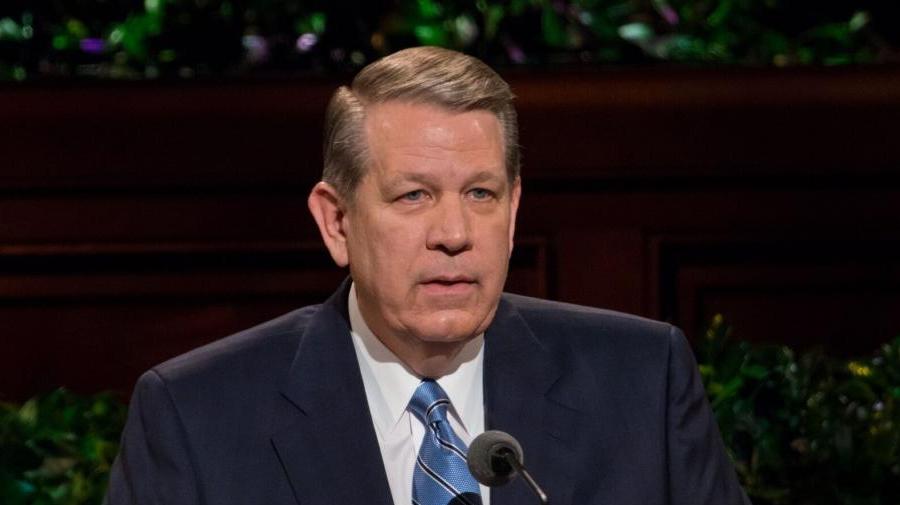

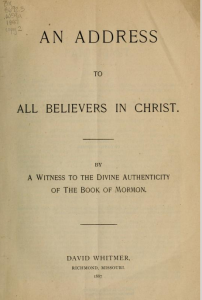




 The Book of Mormon nowhere teaches that the Father is a person with flesh and bones, but rather it says He is spirit (Alma 18:26-29; Alma 22:8-11)
The Book of Mormon nowhere teaches that the Father is a person with flesh and bones, but rather it says He is spirit (Alma 18:26-29; Alma 22:8-11)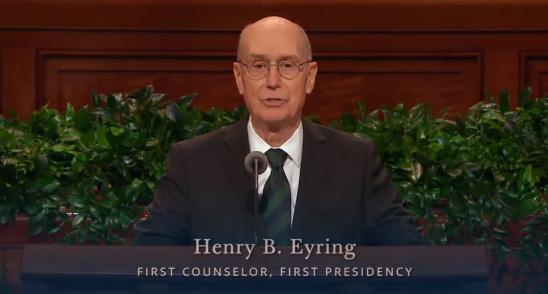
 have been helping with the relief efforts for these horrible events in Texas and others areas, this attitude of servanthood is littered throughout all the talks in this session and I can’t help but be impressed by it.
have been helping with the relief efforts for these horrible events in Texas and others areas, this attitude of servanthood is littered throughout all the talks in this session and I can’t help but be impressed by it.

 And There Shall Be No More Death
And There Shall Be No More Death Dallin H Oaks answers our question with a three point sermon. As a Baptist, this warmed my heart.
Dallin H Oaks answers our question with a three point sermon. As a Baptist, this warmed my heart.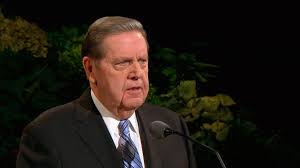 LDS apostle Jeffrey R Holland throws some light on it.Summing up the conference, he congratulates warmly the attendees and others watching around the world for their faithfulness. Quoting Hebrews 10:32, he goes on to speak of ‘post-illumination affliction,’ those days when the thrill of following the Great Plan fades and reality kicks in.
LDS apostle Jeffrey R Holland throws some light on it.Summing up the conference, he congratulates warmly the attendees and others watching around the world for their faithfulness. Quoting Hebrews 10:32, he goes on to speak of ‘post-illumination affliction,’ those days when the thrill of following the Great Plan fades and reality kicks in.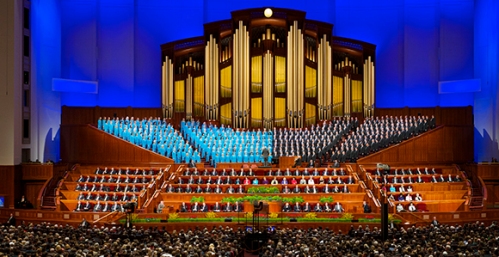
 I woul
I woul